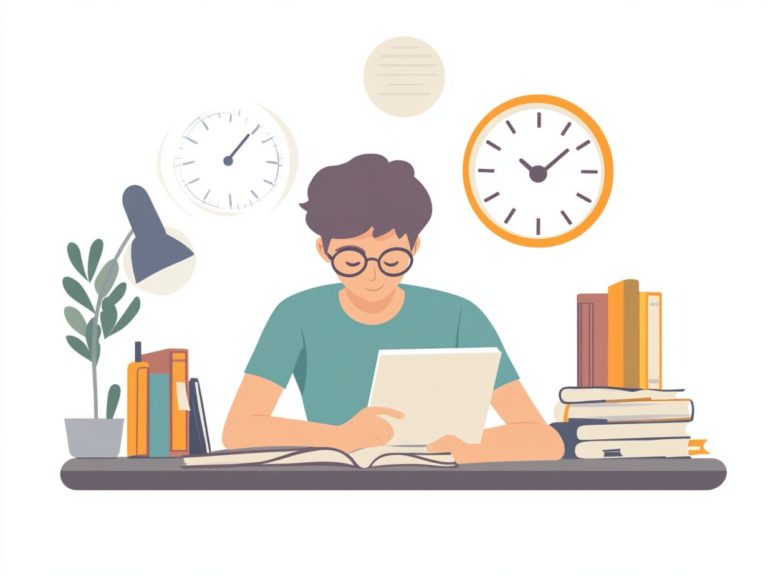overcoming test anxiety: techniques that work
Test anxiety impacts countless students, frequently resulting in heightened stress and subpar performance during exams.
Grasping the essence of test anxiety and its root causes is essential for addressing this prevalent challenge.
This article delves into the ramifications of test anxiety on both performance and mental well-being while presenting practical strategies to conquer it.
From mindfulness techniques to efficient study methods, you’ll find guidance on cultivating a supportive atmosphere and establishing a network that empowers you to reclaim control and confidence in testing scenarios.
Contents
Key Takeaways:

Recognize the causes of test anxiety and its impact on performance and mental health.
Practice mindfulness and relaxation techniques, and use effective study strategies to overcome test anxiety.
Build a supportive environment by creating a support network, seeking professional help, and taking control of test anxiety.
Understanding Test Anxiety
Understanding test anxiety requires you to grasp its definition, causes, and the multifaceted dimensions it encompasses. This includes emotional and physical symptoms that many students face, especially during high-pressure times like Finals Week.
You may find yourself grappling with self-doubt and negative self-talk, often intensified by lofty expectations and the weight of perfectionism. This leads to a cycle of performance anxiety that can significantly affect your mental health and overall academic success.
Definition and Causes
Test anxiety is a psychological condition that may feel all too familiar characterized by an overwhelming sense of worry and fear surrounding academic assessments. This anxiety can lead to emotional symptoms such as self-doubt and negative self-talk, along with physical reactions like an increased heart rate and sweating.
It s not just a passing concern; it can manifest as a persistent dread that significantly impacts your performance and overall well-being.
Various factors contribute to this anxiety, including the pressure of high expectations from parents, educators, or even yourself. The cognitive distortions associated with test anxiety can cause you to overestimate the consequences of failure, setting off a cycle of nervousness that makes it difficult to focus.
You may experience emotional turmoil, like feelings of debilitating dread, while physical symptoms can range from nausea to trembling hands both of which can seriously detract from your ability to perform at your best during assessments.
Effects of Test Anxiety

The effects of test anxiety reach far beyond simple discomfort; they can profoundly hinder your performance and overall mental well-being.
This often results in subpar academic outcomes and heightened stress levels. This makes it crucial to adopt effective strategies to manage anxiety.
Impact on Performance and Mental Health
Test anxiety can profoundly affect your academic performance, often resulting in lower test scores, higher dropout rates, and emotional symptoms that can lead to long-term mental health issues.
This issue impacts your grades and takes a toll on your overall well-being, creating a relentless cycle of stress and frustration.
As exam periods approach, many students find themselves engulfed by feelings of fear, worry, and self-doubt, which ultimately impairs their ability to focus and retain information.
Emotional symptoms like panic attacks, irritability, and even physical issues such as headaches can surface, making it essential for you to recognize and address these challenges.
Using effective coping strategies like mindfulness, structured study schedules, and support from peers or counselors can significantly reduce anxiety.
This empowers you to tackle tests with renewed confidence and resilience.
Techniques to Overcome Test Anxiety
Techniques to conquer test anxiety encompass everything from mindfulness practices to top mental techniques to reduce test anxiety and effective study strategies.
By understanding how to integrate calming techniques and breathing exercises into your routine, you can empower yourself to manage anxiety effectively and enhance your academic performance.
Unlock Your Potential with Mindfulness

Mindfulness and relaxation techniques, like deep breathing exercises and guided meditation, can help you take control of your anxiety. Incorporating tips for reducing test day stress into your routine fosters a sense of calm and focus, allowing you to approach exams with a more balanced mindset.
By using these strategies, you create a mental buffer against the pressures of assessments. Research from the American Psychological Association shows that consistent mindfulness practice enhances concentration and reduces stress symptoms.
Integrating mindfulness techniques into your study routine can lead to improvements in your academic performance.
Experts recommend progressive muscle relaxation to reduce physical tension related to anxiety. Engaging in these techniques builds emotional resilience, making you better equipped to handle exam stress.
Effective Study Strategies
Effective study strategies, such as good time management, regular review of resources, and structured exam preparation, can greatly reduce performance anxiety. These habits instill confidence in students facing test-related stress.
Implementing these techniques leads to a more organized study approach, which helps with information retention. Establishing a routine lets you allocate specific time slots for different subjects, making study sessions more efficient.
Active learning methods, like summarizing material in your own words or teaching concepts to peers, significantly boost comprehension.
By taking regular breaks to recharge and practicing mindfulness, you not only ease anxiety but also enhance your exam performance, resulting in more positive academic outcomes.
Creating a Supportive Environment
A supportive environment is essential for anyone dealing with test anxiety. Access to peer support, tutoring services, and wellness resources can boost resilience and coping strategies during high-pressure times, like Finals Week.
Equip yourself with the right tools to effectively navigate these challenges.
Building a Support Network

Building a strong support network is crucial for combating test anxiety. This network provides emotional support, shares coping strategies, and alleviates feelings of isolation.
Your support system can include friends, family, and classmates who understand exam pressures. Join study groups to exchange ideas and techniques for managing stress.
Reaching out to counselors or participating in online forums can also be beneficial. Sharing experiences and learning how others cope fosters camaraderie.
When peers discuss their strategies, whether mindfulness exercises or time management tips, it normalizes anxiety and equips you with effective tools to face it head-on.
Seeking Professional Help
If you’re grappling with severe test anxiety, seeking professional help is crucial. Services like Counseling and Psychiatric Services offer tailored coping mechanisms to effectively manage your anxiety.
These programs address the unique challenges you face while preparing for exams, providing one-on-one counseling and group workshops focused on stress management.
Incorporating cognitive-behavioral therapy (CBT) and mindfulness practices creates a supportive environment to explore the root causes of your anxiety.
Many centers also offer psychoeducation on test preparation and time management skills. This equips you with essential tools to confront academic challenges confidently. Engaging with these resources enhances your coping abilities and fosters resilience, leading to improved performance when it matters most.
Start practicing these techniques today for a more confident exam experience!
Taking Control of Test Anxiety
Taking control of test anxiety requires effective coping strategies, including strategies for reducing test-taking pressure. These help address self-doubt and negative thoughts, giving you the power to confront performance anxiety confidently.
Engaging in mindfulness practices, like breathing exercises and visualization techniques, can create a calm and focused mental space.
Reach out to friends or professionals for support. This can make a significant difference and help you feel less alone.
Journaling about your thoughts and feelings before tests can transform negative energy into productive motivation.
Using positive affirmations counters harmful thinking and strengthens your self-belief. This helps you reframe your thoughts around tests.
These strategies equip you to handle academic challenges. You can face tests with confidence and poise.
Frequently Asked Questions
What is test anxiety?
Test anxiety is the fear, nervousness, and stress experienced before, during, or after a test. It can cause physical symptoms like a rapid heart rate and difficulty concentrating.
How can test anxiety affect my performance?
Test anxiety can hinder your performance. It may cause you to forget information or rush through questions, leading to lower scores.
What techniques can help me overcome test anxiety?
Techniques like deep breathing and positive self-talk can help. Consider visualization and effective time management as well.
How can deep breathing help reduce test anxiety?
Deep breathing relaxes both the body and mind. It increases oxygen flow, calming your nerves and improving focus.
Is it helpful to practice relaxation techniques before a test?
Yes, practicing relaxation techniques before a test can help you feel calm and confident. Try progressive muscle relaxation or mindfulness meditation.
Can seeking help from a therapist be beneficial in overcoming test anxiety?
Yes, a therapist can help identify the causes of your anxiety. They provide personalized coping strategies and a supportive space to discuss your concerns.






